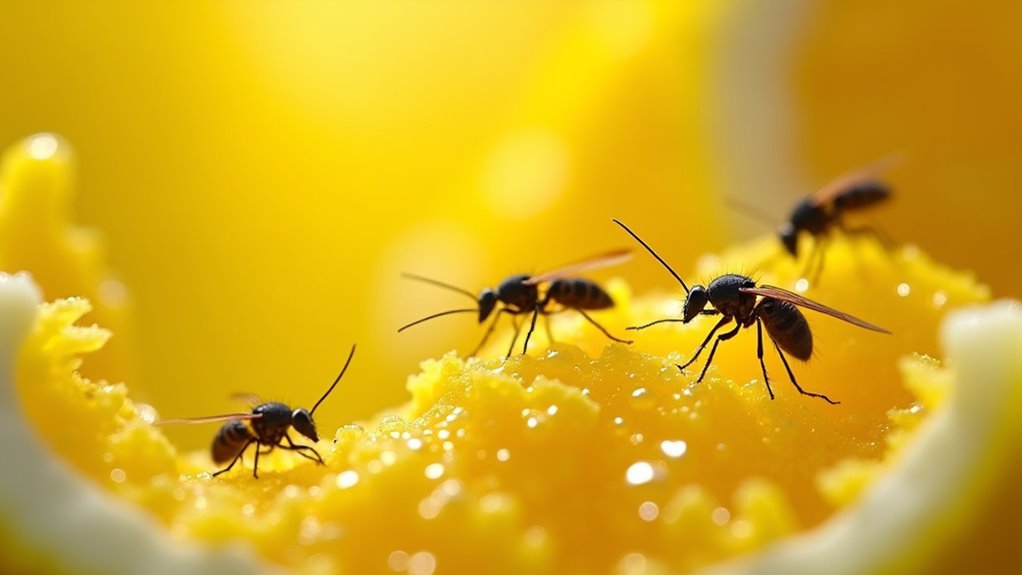Lemon zest’s effectiveness comes from its concentrated essential oils, particularly limonene, which disrupts insects’ sensory receptors and blocks their chemical communication signals. The high citric acid content damages insect exoskeletons and creates an inhospitable environment they naturally avoid. These compounds mask attractant scents and interfere with navigation systems, causing immediate avoidance behaviors in ants, mosquitoes, flies, and other pests. You’ll discover specific application techniques and enhancement methods that maximize these natural repelling properties.
The Science Behind Lemon Zest’s Natural Repellent Properties

When you’re searching for a natural alternative to chemical pesticides, lemon zest emerges as a powerful ally backed by solid science. This natural insect repellent contains limonene, a compound that disrupts insects’ sensory perception, making them avoid treated areas.
You’ll find that lemon zest’s high citric acid concentration damages insect exoskeletons, creating an effective deterrent against various pests. The zest’s essential oils provide additional protection through antibacterial and antifungal properties, establishing an inhospitable environment for insects.
When you apply lemon zest in ant-infested areas, its scent masks their chemical trails, disrupting their foraging patterns and preventing return visits to food sources. You can maximize effectiveness by combining lemon zest with other natural deterrents, creating synergistic effects that enhance overall pest repulsion.
Essential Oils in Lemon Zest That Insects Avoid
The specific essential oils within lemon zest hold the key to its remarkable insect-repelling power. When you use lemon zest, you’re harnessing nature’s most effective compounds that insects can’t tolerate.
| Essential Oil | Primary Effect | Target Insects |
|---|---|---|
| Limonene | Disrupts sensory receptors | Mosquitoes, flies, ants |
| Citral | Masks attractant scents | Moths, gnats, beetles |
| Linalool | Creates hostile environment | Cockroaches, fleas |
| Geraniol | Interferes with navigation | Wasps, fruit flies |
These essential oils work synergistically to repel insects through multiple mechanisms. Limonene’s high concentration disrupts how insects locate food and breeding sites, while citral masks the chemical signals that typically draw pests to your space. You’ll find this combination creates an invisible barrier that effectively keeps unwanted insects away naturally.
How Limonene Disrupts Insect Communication Systems

When you apply lemon zest around your home, limonene actively blocks the chemical signals insects use to communicate with each other.
This powerful compound interferes with their ability to detect pheromones, effectively cutting off the crucial pathways insects rely on for navigation and social coordination.
You’re fundamentally jamming their communication network, leaving them unable to find food sources or coordinate with their colonies.
Limonene Blocks Chemical Signals
Insects rely heavily on chemical signals to navigate their world, but limonene disrupts this essential communication network by interfering with their olfactory receptors. When you use lemon zest around your home, you’re deploying a natural compound that effectively scrambles insects’ ability to detect important scent cues.
Here’s how limonene blocks these critical chemical signals:
- Pheromone interference – It prevents insects from detecting mating signals, disrupting their reproductive cycles.
- Foraging disruption – Limonene masks food source scents that guide insects to feeding areas.
- Navigation confusion – It blocks territorial markers insects use for movement and orientation.
- Behavioral changes – Exposed insects show decreased activity levels and altered responses.
This ability to disrupt communication helps repel mosquitoes and other pests while creating safer environments for beneficial insects.
Disrupted Pheromone Detection Pathways
Among these disrupted chemical signals, pheromone detection pathways suffer the most notable interference when limonene encounters insect olfactory systems.
You’ll find that this compound directly affects insects’ olfactory receptors, reducing their sensitivity to vital pheromones needed for mating and foraging behaviors. When you apply lemon zest around your property, the limonene masks and alters these essential chemical signals, causing confusion and disorientation among insects.
This disruption makes it considerably harder for insects to locate food sources or potential mates.
Research demonstrates that limonene exposure dramatically decreases insect attraction to pheromone traps, proving its effectiveness in pest control applications. By targeting these fundamental communication systems, limonene serves as an excellent natural insect repellent, offering you an eco-friendly alternative to synthetic pesticides.
Citric Acid Content and Its Impact on Pest Behavior
You’ll find that lemon zest’s citric acid concentration directly influences how effectively it repels insects from your space.
When pests encounter this acidic environment, they’ll exhibit clear avoidance behaviors since the high acidity disrupts their comfort and feeding patterns.
The stronger the citric acid content in your lemon zest, the more pronounced these behavioral responses become in target insects.
Citric Acid Concentration Effects
When citric acid concentrations reach ideal levels in lemon zest, they’ll create a potent deterrent that disrupts insects’ fundamental survival mechanisms. This powerful compound affects deterring pests by interfering with their ability to navigate and locate essential resources.
The concentrated citric acid works through several key mechanisms:
- Sensory disruption – High concentrations overwhelm insects’ receptors, preventing them from detecting food sources effectively.
- Behavioral modification – Strong acidity triggers immediate avoidance responses in ants and mosquitoes.
- Environmental alteration – Creates unfavorable conditions that insects instinctively avoid.
- Antimicrobial action – Reduces bacteria growth that typically attracts unwanted pests.
You’ll find that ideal citric acid levels greatly influence insect behavior, making your natural pest control efforts more successful and long-lasting.
Insect Behavioral Response Mechanisms
Understanding how insects react to citric acid reveals the sophisticated ways these compounds alter pest behavior at multiple biological levels.
When you apply lemon zest, you’re disrupting insects’ sensory perception through citric acid’s acidic properties, causing immediate discomfort that triggers avoidance behaviors.
The limonene in this natural deterrent masks critical pheromone signals insects rely on for navigation and communication, fundamentally blinding them to their environment.
You’ll notice ants and mosquitoes actively avoiding treated areas because the acidic nature creates physical irritation.
Unlike synthetic insect repellents, lemon zest’s essential oils interfere with feeding patterns and reproductive cycles, creating long-term behavioral changes.
This multi-layered approach explains why insects don’t simply adapt to lemon zest treatments over time.
Comparing Lemon Zest to Other Citrus Peels for Effectiveness

While several citrus peels offer natural pest control benefits, lemon zest stands out as the most potent option for insect deterrence.
You’ll find that lemon zest outperforms other citrus peels in multiple ways when controlling unwanted pests.
Here’s why lemon zest delivers superior insect-repelling properties compared to other citrus peels:
- Higher limonene concentration – You’re getting more of the compound that actually repels mosquitoes and flies than what’s found in orange or lime peels.
- Stronger scent masking – The intense citrus aroma effectively blocks natural scents that attract insects to your space.
- Added antibacterial benefits – You’re not just repelling pests; you’re also getting antimicrobial protection that other citrus peels can’t provide.
- Enhanced synergistic effects – When you combine lemon zest with other natural repellents, it amplifies overall effectiveness.
Which Insects Are Most Affected by Lemon Zest
You’ll find that lemon zest affects three main categories of insects with varying degrees of success.
Flying pests like mosquitoes respond most dramatically to limonene’s repellent properties, while crawling household insects such as ants show significant avoidance behaviors.
Garden-damaging insects also retreat from treated areas, though their sensitivity levels differ depending on the specific species you’re targeting.
Mosquitoes and Flying Pests
Because lemon zest contains limonene—a powerful natural compound—it’s particularly effective at repelling mosquitoes and other flying pests that rely on sensory receptors to locate their targets.
This natural repellent works by disrupting their ability to detect you through multiple mechanisms.
Here’s how lemon zest protects you from flying insects:
- Masks detection signals – The essential oils hide your carbon dioxide emissions and body heat that normally attract mosquitoes.
- Disrupts sensory systems – Limonene interferes with insects’ ability to navigate toward human hosts.
- Deters multiple species – Effective against flies, wasps, and disease-carrying Aedes aegypti mosquitoes.
- Provides chemical-free protection – Offers a healthier alternative to synthetic repellents while maintaining effectiveness.
Research confirms lemon zest’s potency against mosquitoes that transmit dengue and Zika virus.
Crawling Household Insects
The same potent limonene that deters flying pests proves equally effective against crawling household invaders.
You’ll find lemon zest particularly powerful against ants and cockroaches, as its strong citrus scent disrupts their natural navigation systems. When you scatter fresh lemon zest around entry points, it interferes with ant pheromone trails, making communication impossible within their colonies.
The high acidity creates an inhospitable environment that crawling insects actively avoid.
You can rely on lemon zest’s toxic oils to eliminate pests upon direct contact, while its antibacterial properties provide lasting protection.
This natural pest control method offers you an eco-friendly alternative to harsh chemicals, effectively targeting common household invaders without compromising your family’s safety or environmental health.
Garden Damaging Insects
While indoor pests pose significant challenges, your garden faces an entirely different set of destructive invaders that lemon zest can effectively combat.
The limonene compound in lemon zest disrupts pheromone communication among various garden pests, making it a powerful natural insecticide.
Four major garden damaging insects that lemon zest effectively repels include:
- Aphids and spider mites – Limonene interferes with their communication systems
- Whiteflies – The strong citrus scent deters these vegetable and ornamental plant destroyers
- Mealybugs – Essential oils provide non-toxic protection without chemical pesticides
- Thrips – Research shows reduced presence around treated plants, preventing flower and crop damage
Additionally, lemon zest drives away beetles and caterpillars while preserving beneficial insects in your garden ecosystem.
Proper Preparation Methods for Maximum Potency
For ideal insect-deterring results, you’ll want to grate your lemon zest fresh rather than using pre-prepared alternatives. Fresh zest contains the highest concentration of essential oils that make this effective natural pest control method work.
Use the zest immediately after grating, since exposure to air causes these volatile oils to evaporate quickly, reducing potency.
Fresh lemon zest loses its insect-repelling power within hours as essential oils evaporate, so apply immediately for maximum effectiveness.
You can enhance effectiveness by combining lemon zest with other natural repellents like rosemary or peppermint, which create synergistic deterrent properties.
For broader application, infuse the zest in water to create a spray solution that distributes oils evenly across surfaces.
If you can’t use it right away, freeze the freshly grated zest to preserve oil concentration until you’re ready to deploy it.
Fresh vs. Dried Lemon Zest: Which Works Better
When deciding between fresh and dried lemon zest for insect control, you’ll find that fresh zest consistently outperforms its dried counterpart.
Fresh lemon zest contains markedly higher concentrations of essential oils like limonene, which are vital for effective pest deterrence. The drying process reduces these active compounds, diminishing the insect-repelling properties you’re counting on.
Here’s why fresh zest works better:
- Stronger aroma – Fresh zest releases powerful citrus scents that insects find particularly unappealing.
- Higher oil concentration – Essential oils remain at peak levels in fresh zest.
- Research-backed effectiveness – Studies confirm fresh zest’s superior performance against mosquitoes and ants.
- Optimal potency – Active compounds haven’t degraded through drying.
While dried zest provides some repellent effects, it’s notably less effective than fresh alternatives for homemade sprays and traps.
Creating Homemade Lemon Zest Spray Solutions
Transform your fresh lemon zest into a powerful insect-repelling spray by combining the zest from one lemon with two cups of water in a standard spray bottle.
Let this mixture steep for several hours, allowing the essential oils and limonene to infuse thoroughly. Strain out the zest particles before using to prevent clogging your spray nozzle.
When you create a homemade lemon zest spray, you’re harnessing natural acidity and citrus compounds that effectively keep bugs away.
Focus your spraying efforts around entry points, windows, and outdoor gathering areas where pests commonly appear. For enhanced protection, add a few drops of eucalyptus or tea tree oil to boost the spray’s repelling power.
This dual-purpose solution works for both cleaning surfaces and controlling insects naturally.
Application Techniques for Indoor and Outdoor Use
Successful lemon zest pest control depends on strategic placement and proper application methods tailored to your specific environment. For effective use, you’ll need to position your lemon zest strategically to keep pests away from targeted areas.
Here’s how to apply lemon zest for maximum impact:
- Indoor sachets: Place dried lemon zest in breathable fabric pouches near windows, doorways, and areas where ants or fruit flies congregate.
- Outdoor barriers: Sprinkle fresh zest around garden perimeters, entry points, and vulnerable plant bases to create protective zones.
- Surface spray: Apply your homemade lemon zest-infused spray directly onto affected surfaces, focusing on pest entry routes.
- Regular maintenance: Reapply every 3-5 days to maintain potency, as essential oils naturally diminish over time.
Duration and Reapplication Requirements
Understanding how long lemon zest maintains its pest-repelling power will help you establish an effective maintenance schedule. Fresh lemon zest typically provides effective insect deterrence for 3-4 days before requiring reapplication. The essential oils, particularly limonene, gradually lose potency as they’re exposed to air and environmental conditions.
Environmental factors greatly impact duration. High humidity and temperature accelerate the breakdown of aromatic compounds, reducing effectiveness faster than in cooler, drier conditions. You’ll notice the citrus scent weakening as the repellent properties diminish.
For best results, replace old zest with freshly grated material every few days. Monitor treated areas and reapply when you detect reduced scent intensity.
Consider combining lemon zest with complementary essential oils to extend effectiveness and create a more robust natural barrier against insects.
Safety Considerations When Using Lemon Zest Repellents
While lemon zest offers a natural approach to pest control, you’ll need to follow proper safety protocols to avoid potential health risks. These safety considerations help prevent adverse effects from the essential oils in citrus peels.
- Wear protective gloves when handling lemon zest to prevent skin irritation from limonene, and keep it away from your eyes and sensitive areas.
- Test for citrus allergies by conducting a patch test on a small skin area before widespread use, especially if you have sensitive skin.
- Ensure proper ventilation when using lemon zest repellents indoors to prevent headaches or respiratory discomfort from concentrated scents.
- Keep away from pets, particularly cats, since citrus compounds can be toxic to them.
Combining Lemon Zest With Other Natural Deterrents
Although lemon zest works effectively on its own, you’ll achieve superior pest control results by combining it with complementary natural deterrents.
Mix lemon zest with essential oils like eucalyptus or peppermint to enhance repellent properties, as these natural options contain compounds that also repel insects.
Create a powerful cleaning solution by combining lemon zest with vinegar—the strong scent and acidity deter pests while disinfecting surfaces.
For garden protection, blend lemon zest with salt to create an effective barrier against slugs and soft-bodied pests, as salt enhances the drying effect.
You can even incorporate lemon zest into homemade traps with sugar, using sweetness to lure insects while leveraging the zest’s natural repelling characteristics for capture.
Frequently Asked Questions
How to Use Lemon to Repel Bugs?
You can place lemon zest near windows and entry points, spray lemon juice-water mixtures in bug-prone areas, or scatter crushed lemon peels in your garden to repel insects naturally.
Does Lemon Peel Repel Insects?
Yes, lemon peel repels insects effectively. You’ll find it works because limonene and natural oils mask scents that attract pests. You can place peels around garbage bins, cupboards, or sprinkle ground peels in gardens.
What Is the Strongest Natural Insect Repellent?
You’ll find oil of lemon eucalyptus is the strongest natural insect repellent, containing PMD that’s as effective as DEET. It’ll provide up to 95% mosquito protection for several hours.
What Bugs Hate Lemon Scent?
You’ll find that mosquitoes, flies, ants, and house flies all hate lemon scent. The limonene and citrus compounds disrupt their sensory receptors, making them avoid areas you’ve treated with lemon.
In Summary
You’ll find lemon zest’s effectiveness stems from its potent limonene content and essential oils that disrupt insect sensory systems. When you apply fresh zest around your home, you’re creating a natural barrier that’s safe for your family while deterring unwanted pests. Remember to reapply every few days for ideal results, and don’t hesitate to combine it with other natural repellents like peppermint or lavender for enhanced protection against various insect species.





Leave a Reply